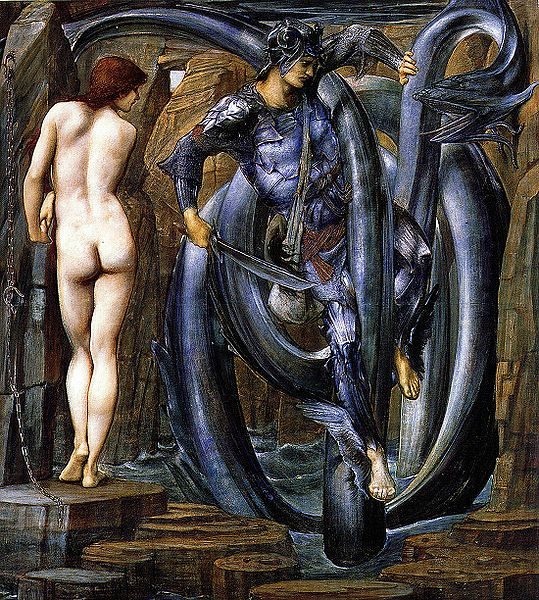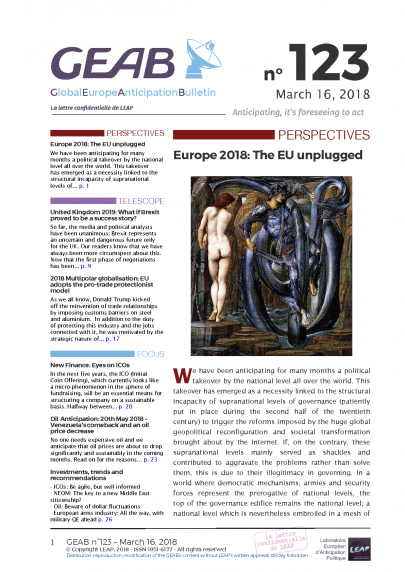GEAB 123

We have been anticipating for many months a political takeover by the national level all over the world. This takeover has emerged as a necessity linked to the structural incapacity of supranational levels of governance (patiently put in place during the second half of the twentieth century) to trigger the reforms imposed by the huge global geopolitical reconfiguration and societal transformation brought about by the Internet. If, on the contrary, these supranational levels mainly served as shackles and contributed to aggravate the problems rather than solve them, this is due to their illegitimacy in governing. In a world where democratic mechanisms, armies and security forces represent the prerogative of national levels, the top of the governance edifice remains the national level; a national level which is nevertheless embroiled in a mesh of transnational agreements based on a principle of mistrust of politics, which led, consensually, at the end of the twentieth century, to a relative disappearance of politics in favour of whole-economics. The wheels of power were thus exposed to a myriad of supranational special interests, themselves eminently compatible with the supranational system.
Special interests, though, are very often opposite to everyone else’s interests, or public good. Because this glue prevented any strong political decision-making, the crises have it harder and harder on human societies which couldn’t help noticing the impotence of their official leaders (whether elected or not, according to the countries) to react.
Ten years have passed since the first major shocks were recorded: Ten years in which the legitimate levels of governance fought to regain control in an epic battle with those supranational systems, some of which led us to the edge of the abyss. In 2018, our team sees and anticipates as a major trend these ‘legitimate’ levels of power gaining control again and thus everything will change very, very quickly. So much so that we feel that, at the end of 2018, the world will not really look like anything we’ve ever known.
This trend is general, challenging the UN, NATO, OPEC, WTO etc. as we knew them. But the EU is particularly emblematic of this phenomenon. It is on this concrete example, without doubt the most integrated in the world, that we shall concentrate in this article within the context of an anticipation of ‘disconnection’ of the integrated level by the Member States in the lead up to the 2019 elections.
The United States of Europe will not happen
In the previous issue, we could not help but be offended by the restarting of the ‘business as usual’ proposals of the Brussels system. Apparently, we were not the only ones to think so. In a month, the arrogant return of a system, though having failed so badly, was again seriously undermined. We will develop this analysis on the basis of some particularly striking examples.
Our loyal readers know how much we anticipate the revival of European dynamics around the eurozone. But they also know how much we believe that only a Euroland based on a project of democratisation of all or part of the European edifice is desirable and sustainable. This is why we followed with interest the proposal for Euroland reform announced by the French President, Emmanuel Macron, based on three simple concepts – a stronger budget, a Finance Minister for the eurozone and democratic control[1].
This project was waiting for the election and then for the end of the post-election political crisis in Germany to begin to take shape. But this ‘transition’ has dragged on far too long, sending Euroland reform into the arms of a European Commission exclusively interested in securing its position in a process of reform based on a Europe of 19 states and not that of Commission – of 28 (or 27). On 6th December, the European Commission imposed on us the publication of a white paper of a purely technocratic reform, whose most ‘daring’ development was to propose the creation of a new position, that of a European ‘minister’ of economy and finance, with no other democratic mechanism than a reference to an unchanged European Parliament (thus representing the 27-28 instead of the 19) [2].
A few weeks later, the aforementioned European Parliament voted against the idea of trans-European lists in an inevitable reaction to protect its corporate interests[3]. One had to be naive to imagine that the national representatives populating the European hemicycle would have agreed to make room for European representatives whose obvious European added value would question their own relevance. This vote was not a surprise (nor is it a reason to stop the trans-European political parties from working towards their emergence in the context of the next European elections). They do not need the consent of the current masters of the European Parliament to impose themselves. That said, the signal sent by these two demonstrations of corporatist survival rather than transformative vision has considerably discredited the Brussels system.
Meanwhile, Germany was running out of steam to set up a government able to work with France, especially on the reform of the eurozone. This is a difficult subject, given the increasingly strong resistance within the German population to continue funding intra-Euroland economic disparities. A political blaze, therefore, which partly explains the delay and the fact that the key posts have ended up being assumed by the SPD members of the Grosse Koalition.[4] Apparently, the CDU members preferred to leave the dirty work of foreign affairs and finance to their opponents… poisoned chalice!
The Franco-German engine seemed ready to support a theoretically desirable eurozone reform – but not at the cost of a loss of sovereignty over monetary affairs. It is not, therefore, by chance that, at the very moment when the Franco-German couple were ready to start, eight northern Europe countries (Denmark, Estonia, Finland, Ireland, Latvia, Lithuania, The Netherlands, Sweden), some of which are not even eurozone members, have blocked any hope of reforming the euro on the basis of a supranational mechanism by publishing a joint declaration in which is clearly written, ‘Decision-making must sit firmly in the hands of the Member States’.[5]
This approach seems very anti-Euro-democratic because they reject the idea of democratic control of the European Parliament on monetary policies. It remains to be seen whether they would agree more with the democratic control of a Eurozone Parliament. This is doubtful. In reality, we have here a third response showing defence of corporatist interests: First, the European Commission against a eurozone governance outside its walls. Second, the European Parliament against transnational lists. Now, the Northern Europe EU Member States against common democratised eurozone governance. In all three cases, European citizens are the ones who are out of the game.
In their defence, the risks currently weighing on the next European election (in which we anticipate as a possible outcome the switch of the European Parliament into the hands of Euro-critical forces) compel the Member States to act in order to avoid any probable political shocks on the single currency (we’ll return to this point later).
Another major area of Europeanisation which is highly desirable is that of defence (which would allow us to really get out of NATO). However, it will not be done for lack of sufficient political legitimacy at the European level. This example is even more emblematic than the one about money: Imagine leaving the keys of our defence to a non-political and undemocratic entity? Therefore, for the time being, the European defence will remain the prerogative of the Member States who call on to the European Commission, not to recover the function, but to do its job: To create the conditions for greater cohesion between the Member States – a mission the Commission has no longer properly fulfilled in many years. Well-tried though, Mr Juncker, at the Munich Security Conference, but decidedly no![6]
We often write that, unfortunately, History does not have a ‘rewind button’ and that there is never a turning back. We are tempted to think that this kind of decision is a step backwards; a return to the national level in terms of European governance. But we should not forget that the European system, even in the last thirty years, has never been anything other than an intergovernmental system, exclusively based on the good will of the Member States to comply with the common decision-making methods according to the principles they had laid down together. The crisis of the last ten years has revealed that the intergovernmental interactions associated with the principle of unanimity lead to huge political weakness at all levels. It was the will of the Member States to subject themselves to this European game which has been thwarted, thus creating a polarisation phenomenon between a European level of governance demanding full powers to take the ship further and national levels more and more greedy to regain control of their own destinies. The structural disconnection between the European level and the citizens is sealing the victory of the only true level of political legitimacy, the national level, carrying in its stream the project of the United States of Europe dreamed up by a Brussels system turned crazy with its failures and unrealism. So, there is no turning back, but rather a return to reality.

Figure 1 – European surveys: left, economic issues, right the refugee crisis. Source: Pew Research.
Towards a major crisis of the Brussels system
A very strong indicator of the European Commission’s deactivation procedure comes out of the impressive series of mini-scandals currently exploding around this institution. We are paying particular attention to this because it is an anticipation we have had in mind for a few months – a repeat of the Santer Commission scandal (another Luxembourgeois…) which occurred in 1999[7] .
Since last September, no less than five mini-scandals have made the news (or resurfaced), in connection with President Juncker[8], former President Barroso[9], two European Commissioners, Kroes[10] and Avramopoulos[11], as well as Juncker’s main adviser, Selmayr[12], who miraculously became Secretary-General of the Commission (the most powerful job in the entire structure) on an ultra-federalist agenda (even if tainted with democratism). With regard to the Selmayr case, the media already use the term ‘Selmayrgate’. The dust may or may not settle quickly as far as this issue is concerned, but for the entire Brussels decision-making system, the perceived damage must be considerable, helping to legitimise a takeover at national levels of governance.
Login

So far, the media and political analysts have been unanimous: Brexit represents an uncertain and dangerous future only for the UK. Our readers know that we have always been more [...]
As we all know, Donald Trump kicked off the reinvention of trade relationships by imposing customs barriers on steel and aluminium. In addition to the duty of protecting this industry [...]
In the next five years, the ICO (Initial Coin Offering), which currently looks like a micro-phenomenon in the sphere of fundraising, will be an essential means for structuring a company [...]
No one needs expensive oil and we anticipate that oil prices are about to drop significantly and sustainably in the coming months. Read on for the reasons behind this anticipation. [...]
- ICOs: Be agile, but well informed - NEOM: The key to a new Middle East citizenship? - Oil: Beware of dollar fluctuations - European arms industry: All the way, [...]

Comments